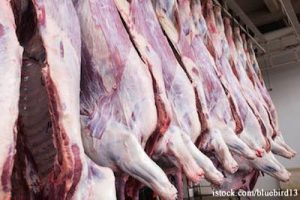There is a problem with inspector shortages at the USDA’s Food Safety and Inspection Service (FSIS). This fact threatens the safety of all Americans, since inspectors are on the front line against foodborne pathogens in the food supply.
 A letter sent to Representative Robert Aderholt (R-AL), Chairman of the House Subcommittee on Agriculture and Rural Development from Executive Director Wenonah Hauter states, “after finally making some progress on long-standing problems with inspection staffing for U.S. meat, poultry, and egg products facilities in FY 2012, FSIS embarked on a policy not to hire permanent inspectors to fill vacancies, but instead to hire temporary inspectors to fill the positions. This was based on the agency’s plan to drastically change the way inspection is conducted in poultry slaughter plants [HIMP].”
A letter sent to Representative Robert Aderholt (R-AL), Chairman of the House Subcommittee on Agriculture and Rural Development from Executive Director Wenonah Hauter states, “after finally making some progress on long-standing problems with inspection staffing for U.S. meat, poultry, and egg products facilities in FY 2012, FSIS embarked on a policy not to hire permanent inspectors to fill vacancies, but instead to hire temporary inspectors to fill the positions. This was based on the agency’s plan to drastically change the way inspection is conducted in poultry slaughter plants [HIMP].”
The government has been unable to attract candidates to these positions because the jobs do not have benefits, are of limited duration, and do not come with the same rights given to permanent employees. Representative Aderholt had questioned a New York Times article on this issue and the letter from Food & Water WAtch was written to correct him.
Because of the shortages, FSIS has to use veterinarians and Enforcement, Investigation, and Analysis Officers to staff slaughter lines. In addition, other inspection personnel are being doubled-up and tripled-up in their assignments. Since the new hiring policy went into effect, there has been an increase in the number of USDA recalls because products it inspects have entered into the marketplace without the benefit of inspection.
The huge 8.7 million pound Rancho Feeding Corporation recall falls into this category. There was a shortage of inspection personnel assigned to that plant. Food & Water Watch received an email from Dr. Keith Gilmore at FSIS to Charles Painter, Chairman of the National Joint Council of Food Inspection Local Unions that stated, “Rancho Foods was found guilty of slaughtering diseased cull cattle without the benefit of ante-morten inspection during the lunch hour when IPP were in the office. Our employees were in the plants, however were not in the pens at the time that these activities were occurring.”
This is the same problem uncovered in 2008 at the Hallmark/Westland beef slaughter plant, where possible inclusion of downer cattle in ground beef caused the largest beef recall in history – more than 140 million pounds. At that plant, FSIS did also not station inspection personnel in the holding pens. And the same thing is happening six years later.
More troubling is the fact that the Acting Under Secretary for Food Safety for USDA testified before Congress in early April that there were no staffing shortages three days after another email was sent to Mr. Painter from Mr. Gilmore stating that “critical staffing needs” were a problem. In addition, the agency officials who testified before Congress on April 3, 2014 had never worked a day as FSIS inspectors. At that time there were over 800 vacant positions in the FSIS inspection area.




